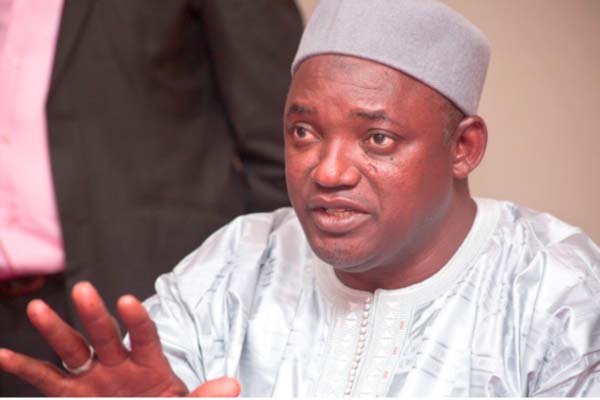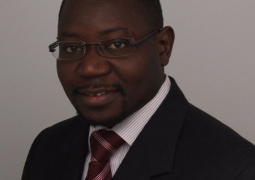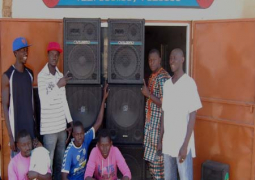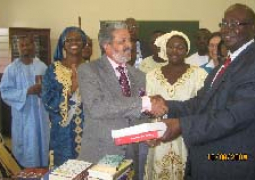
The
office of President Elect Barrow wishes to convey the assurance of its highest
esteem to Ex–President John Dramani Mahama for demonstrating the political will
to uphold the verdict of the Ghanaian people, after losing the 7th December
2016 polls by handing over Executive power to President Nana Akufo Addo in a
peaceful manner within the 30 day transition provided by the Ghanaian
Constitution. This is the Democratic culture of peaceful transfer of Executive
power that is being nurtured in the member states of ECOWAS.
In
contrast, the peaceful transfer of Executive power in Gambia, which held its Presidential
Elections on 1st December 2016 and which should take place when the term of
office of the incumbent ends, is still a subject of discussion by Gambians, in
particular, and the International Community, at large.
The
Office of the President-Elect has made it absolutely clear that the exercise of
right to file an election petition by the loser does not deprive the winner the
right to prepare for his inauguration as President of the Republic on 19th January 2017 after the term of the
incumbent expires.
It
should be abundantly clear that it is neither in line with law nor commonsense
for a loser to have the right of the victor suspended until an election
petition is heard.
The
right of a victor to be sworn in as President and the duty of an incumbent to
leave office when one’s term ends are not invalidated by filing an Election
Petition. The Office of the President- Elect stands by the principle that Adama
Barrow’s Election as President of the Republic of The Gambia stands and is
calling for the general mobilisation of the people for the inauguration on 19th
January.
The
status and outcome of an Election petition are unknown and indeterminable
before the completion of any court process and should therefore be regarded as
a peripheral issue which should not hamper any preparation for the
inauguration.
The
current effort by the loser to use the court case as a tool to mobilise his
supporters to give the impression that they have been cheated of victory is
contributing to the fear that he is not ready for a peaceful transfer of power.
This
is why some countries are issuing travel advice and some people are also
relocating.
The
ECOWAS Authority, however, has clarified its position so that no one would
claim that they are siding with anyone in The Gambia other than the Gambian
people, whose verdict must be respected.
The
Chairperson of the Authority stated among other things at the inauguration of
President Nana Akufo Addo of Ghana that “ECOWAS perhaps faces the most
difficult situation in The Gambia…. After accepting he lost the election,
President Jammeh …..questioned the results of the election. He has submitted
his grievances to the Supreme Court which will start its review process on
January 10.
ECOWAS
is closely following the process and the President of the Federal Republic of
Nigeria is leading the effort as ECOWAS mediator.
We
call on the people of Gambia to follow the example of Ghana and put the
interest of the nation above all personal interests. ECOWAS stands by the
people of Gambia and will exercise every effort to sustain peace and democracy.
We stand by the people of The Gambia and want to assure them of our unwavering
adherence to the principles of democracy in our entire region.”
It
is clear that ECOWAS stands for mediation. Force only comes when Gambians are
at each other’s throat and when power is taken or maintained
unconstitutionally. Hence, the Office of the President-Elect is calling on
ECOWAS to speed up the coming of President Buhari to explore peaceful ways of
solving the impasse.
It
is evident from the visits of the Religious, Civic, Business, Traditional and
Community leaders; the solidarity messages from NGOs, the demonstration of
political will by Gambian Ambassadors and the general mood of the people in the
street that most Gambians want the incumbent to hand over political office in
peace.
The
first duty to be shouldered by the incumbent to prove that he stands for peace
is to tell the people that he will leave office when his term expires and would
hand over to the person declared elected by the IEC at the end of his term. He should
then add that he has filed a petition in court whose outcome and effect would
be communicated to the public in due course. This should have been followed by
declaration by security chiefs of readiness to pay obedience to any civil
authority that emerges out of Electoral processes in the Gambia. Such messages
would have gone down well with the Gambian population and the world.
The
current mobilisation for an uncertain court case is sending the wrong signal.
The
travel advice issued by the US Department of State reads:
“The
U.S. Department of State has warned U.S. citizens against travel to The Gambia
because of the potential for civil unrest and violence in the near future.
On
January 7, 2017, the Department of State ordered the departure of family
members and authorised the departure of all employees who need to accompany
those individuals from the country.
The
security situation in The Gambia remains uncertain following December 1, 2016
presidential elections.
On
January 10, the Supreme Court is scheduled to hear the current president’s
petition contesting the election results, which is a potential flashpoint that
could lead to civil unrest. The sitting
government has begun taking restrictive measures, which include shutting down
and restricting radio stations, and making politically motivated arrests.
The
Economic Community of West African States (ECOWAS) has stated it may intervene
if the president does not step down by January 18.
U.S.
citizens should consider departing on commercial flights and other
transportation options now, as airports and ferry terminals may close
unexpectedly in the event of unrest.”
The
Office of the President-Elect therefore is of the view that no Gambian would
have the moral authority to claim to love the Gambia by subjecting her people
to unrest while other nationals are safeguarding their own people from unrest.
No single Gambian could violate the peace of the country if all Gambians,
civilian and military, stand for peace. Only the commitment of each to the principle
of One Gambia, One Nation and One People could ensure the peace of the country
based on democracy and justice.
Our
citizens have no other home to run to. Gambia is their home land. Leaders come
and go but Gambia remains. The road to peace is clear. The incumbent should
recognise the right of the President-Elect to assume office whenever his term
expires while pursuing his court case as a private matter.
He
should also prepare all state institutions and agents to acknowledge such
reality by paying due regard to the concerns of the Incoming administration.
It
is already judicial precedence to swear in a President while an Election
Petition is filed challenging the validity of an Election. This is what
happened in the case of John Dramani Mahama after the December 2012
Presidential Election in Ghana. The Petition was ultimately dismissed after he
was already sworn in as President.
Some
people have alleged that the incumbent has security concerns. The Office of the
President-Elect has demonstrated that any future Ex-President would have the
same status as Ex-President Jawara. Hence, no excuse should be given for
derailing the verdict of the people.
The
Office of The President Elect wants to assure the Gambian people its firm
allegiance to the Gambia and obliges everyone associated with the office to vow
to be ever true to the homeland.




